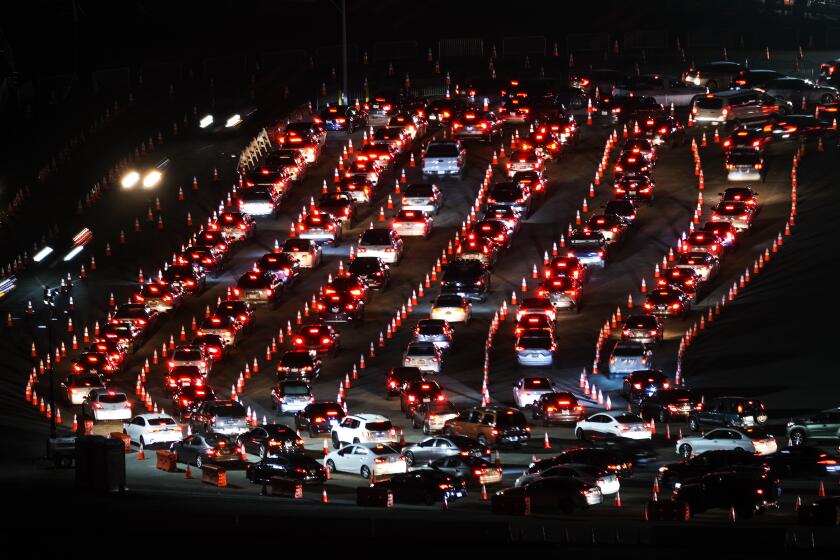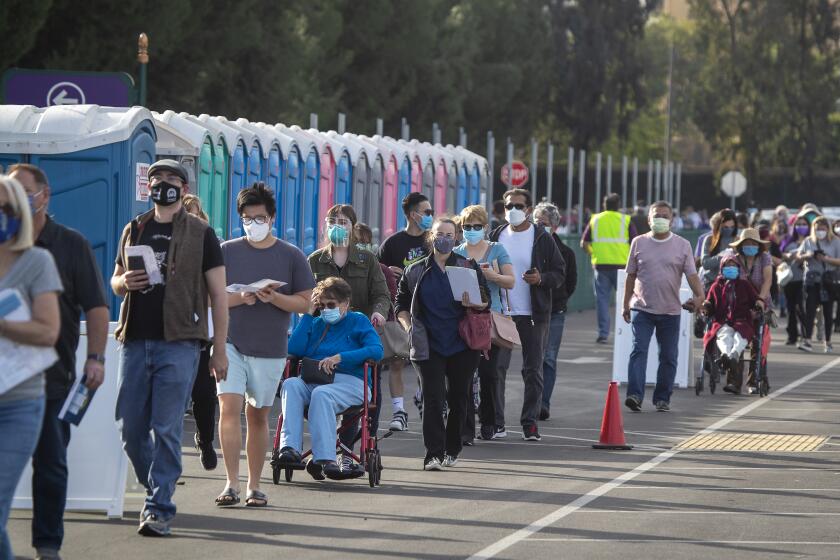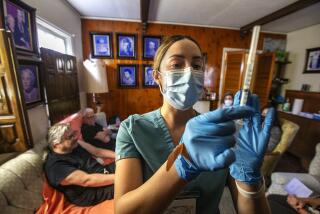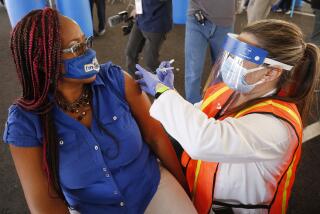Theyâre the most likely to die from COVID-19, but hardly any have been vaccinated
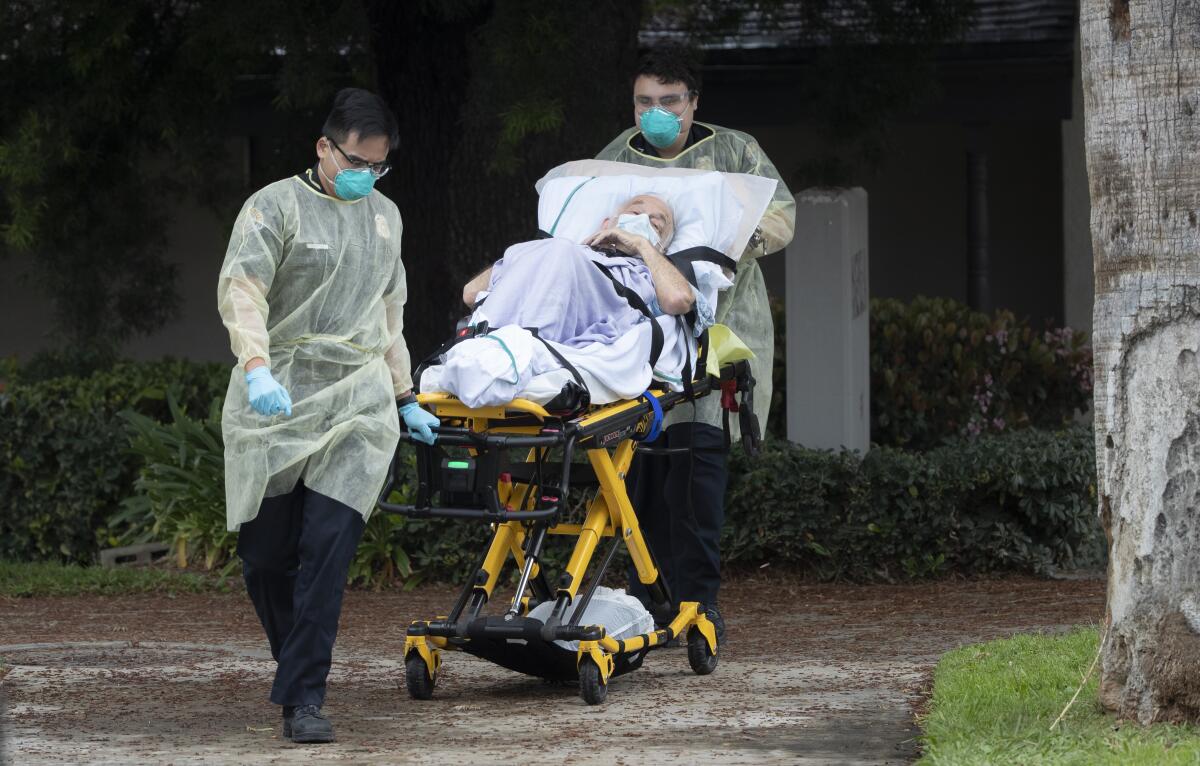
As public health officials scramble to clear a backlog of unused COVID-19 vaccine by opening the process to anyone 65 or older, new data show they failed to quickly deliver shots to the vast majority of Californiaâs most vulnerable residents, who were supposed to be the priority.
As of Sunday, only about 5% of long-term care facility residents in the statewide vaccination program â including people in skilled nursing homes and assisted living centers â had been vaccinated, according to California Department of Public Health data obtained by The Times.
And while the vaccines became available in the U.S. in mid-December, only 3% of California facilities in the program had been scheduled for their first visit from a vaccination team as of Sunday, the data show.
âI find that infuriating,â said Lee Collins, whose 91-year-old mother is in a Beverly Hills assisted living facility where nobody had been vaccinated as of midweek and no date had been scheduled for vaccinations to begin, according to the state data. âI thought the elderly were supposed to be the priority, but clearly that has not happened.â
The previously unpublicized data, contained in an email from a state health department official to an advisory panel including geriatricians and advocates for the elderly, list 17,400 California long-term care facilities enrolled in the vaccine program run by the Centers for Disease Control and Prevention and the large pharmaceutical chains CVS and Walgreens.
The vast majority of those facilities, more than 90%, are assisted living facilities, which typically house elderly people who can no longer care for themselves. They often have cognitive issues such as dementia, but are not sick enough to require the higher level of medical care provided by skilled nursing facilities.
Almost none of the nearly 360,000 residents of assisted living facilities on the list had been vaccinated as of Sunday.
âItâs tragic,â said Dr. Matthew Lefferman, a geriatrician whose practice consists mostly of residents in small assisted living facilities scattered across Southern California. None of those homes had received the vaccine as of midweek, he said.
While most of those facilities got through the first wave of coronavirus pretty well, âthe recent surge has been devastating,â Lefferman said. Of his nearly 600 patients, at least 35 have died of COVID-19 since December.
âWeâve known the vaccine is coming for months, now, so why is it taking so long?â Lefferman asked.
The answer: It wasnât until Monday that state health officials, who set the priorities for the vaccine program, authorized the pharmacies to start vaccinating at assisted living facilities, according to a statement sent to The Times by CVS.
A âtragic, upsetting and frankly overwhelmingâ situation unfolds as COVID-19 deaths soar in L.A. County.
The stateâs first priority was skilled nursing facilities, where the pharmacies started vaccinating on Dec. 28, according to CVS and the CDC.
But even at the 855 California skilled nursing facilities in the program, only 26% of residents had been vaccinated as of Sunday, according to the data.
Darrel Ng, a spokesman for the California Department of Public Health, said the state did authorize vaccinations in assisted living centers on or about Dec. 28, which is when the state had enough doses on hand. âAt that point, it generally takes two weeks for CVS and facilities to schedule and start clinics, which is Jan. 11,â Ng said.
The numbers are more encouraging in L.A. County, where public health officials opted to control vaccination in skilled nursing facilities themselves. Sixty-six percent of residents had been vaccinated as of last week, county officials said, and they hope to complete the process by next week.
Assisted living facilities in L.A. County, however, are still assigned to CVS and Walgreens. As of Sunday, almost none had begun receiving the vaccine, the data show.
The slow rollout of vaccine in these facilities is a problem not just because their residents are dying of COVID-19 in terrifying numbers â nearly 40% of deaths nationwide have been in nursing homes â but they are also disproportionately filling ICU beds in hospitals, which are in desperately short supply in many parts of the state, including Los Angeles.
âHow can we manage this surge if we donât keep those people out of the hospital?â asked Mike Dark, an attorney at California Advocates for Nursing Home Reform.
There are reasons for the delays. A surprising number of residents and staff in facilities have been reluctant to take the vaccine. Getting informed consent from residents with dementia can be time consuming, especially if a family member has to be tracked down to provide that consent. And thereâs the sheer bureaucracy required to fill out forms and input data so the vaccines can be tracked effectively.
But none of those things should have come as a surprise, say advocates for the elderly, and all levels of government should have been better prepared to administer the shots more quickly.
Now, as federal and state health officials drastically expand the number of people eligible for the vaccine, and local officials plan to turn Dodger Stadium and other large venues into mass vaccination sites, advocates worry residents stuck inside facilities will be left behind in the rush for injections.
âMy mother is not mobile. Even if I were inclined to take her to a [mass vaccination site], I canât expose her to that risk, and she canât stand in line endlessly,â Collins said. âPeople in assisted living are there for a reason. I canât drag her all around the city trying to find a vaccine.â
On Thursday, Collins learned her motherâs facility is scheduled to begin vaccinating next week.
But the delay has still been a source of profound frustration. Collins said sheâs particularly annoyed when acquaintances with only a loose connection to the medical industry brag that they got vaccinated under rules that also prioritize front-line health workers.
âI have a friend who is a nurse, but she hasnât practiced since the pandemic began â she got the vaccine,â Collins said. âHer husband volunteered at a clinic once upon a time, and he got the vaccine too.â
Paul Jaconetteâs 94-year-old mother, who is in Nazareth House, an assisted living facility in Cheviot Hills, also has not been vaccinated. He heard on Wednesday that the first round of shots is scheduled for Jan. 22.
Heâs frustrated by the delay but grateful Nazareth House is finally scheduled. Trying to get his mother to a vaccination center outside of the facility would have been daunting.
It was a day of frustration for seniors trying to make appointments. Some were able to schedule them at retailers but itâs unclear whether those will be honored.
âI live in Santa Barbara, sheâs in L.A.,â Jaconette said. With the severity of the COVID-19 outbreak in L.A. at the moment, âItâs like you donât even want to drive into the county. We have no way of getting her anywhere for a vaccine,â he said.
The vaccination drive, and the promise it holds for an end to his motherâs isolation, canât come soon enough.
âIt has taken a real toll on her, really exacerbated her dementia,â Jaconette said.
During a call this week, she knew what day it was but didnât know the month. At one point, she announced she was about to comb her hair and go for a walk.
When he reminded her thatâs not possible, she said, âOh yeah, thatâs right, Iâm on quarantine.â
More to Read
Sign up for Essential California
The most important California stories and recommendations in your inbox every morning.
You may occasionally receive promotional content from the Los Angeles Times.
